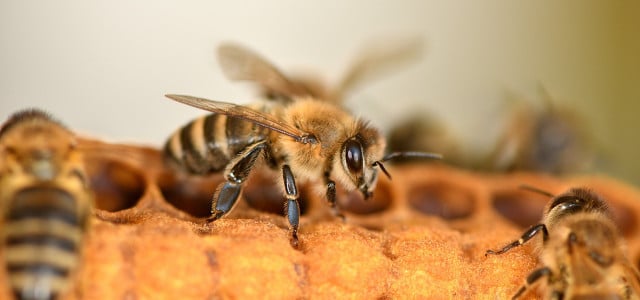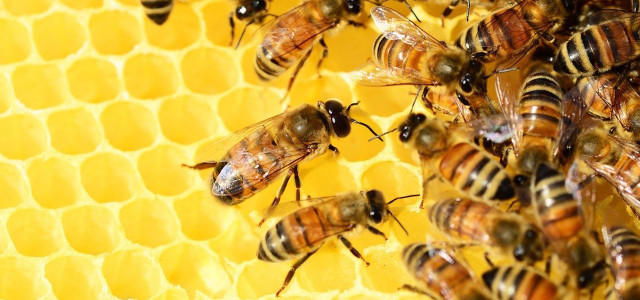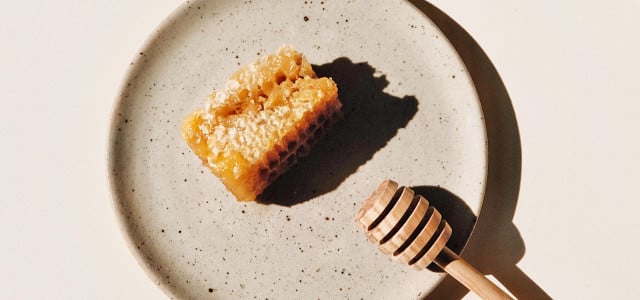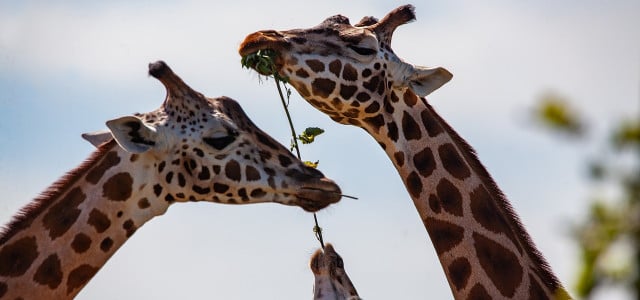Bees are some of the most important pollinators in the world. However, they are constantly threatened by the effects of climate change. So, are honeybees endangered? Read on to find out.
All organisms in our planet, whether they are big or small, have a role to play in the ecosystem, and honeybees are no exception. These pollinators are often underrated, even though they have a crucial role in maintaining a balanced ecosystem. Thanks to them we have fruits to eat, and other creatures have not only food but also shelter from plants pollinated by honeybees. Have you ever thought what would happen to the environment if honeybees would disappear? In this article, we will answer some questions, including: Are honeybees endangered? Which role do honeybees play in the environment? And, how can you help the honeybee?
The Role of Honeybees in the Environment
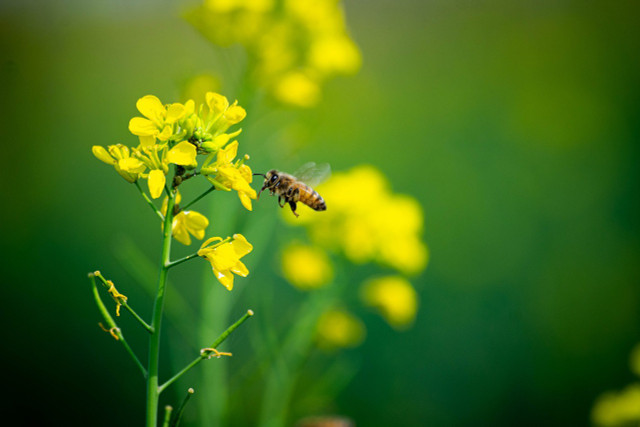


(Foto: CC0 / Pixabay / simpliwonderful)
All creatures in the planet have a role in the environment. In the case of honeybees, it is to pollinate plants to keep a balanced ecosystem: If bees didn’t pollinate then plants wouldn’t grow. Small animals such as other insects, birds, and squirrels wouldn’t have food or shelter (plants and trees that exist thanks to the pollination). Therefore, if honeybees disappeared, small animals would start disappearing as well, which would lead to bigger animals following, and so on.
But honeybees have a much more direct impact on our lives, too. According to the American Beekeeping Federation (ABF), nearly $20 billion from the crop production value in the United States comes from honeybees. In addition to helping plants spread pollen and therefore contributing to the growth of fruits, seeds, and nuts, many farmers also depend on the honeybees to have a successful harvesting season. This means that if honeybees disappeared, agriculture would also be severely affected. Because farmers rely on these pollinators a lot, thousands of honeybee colonies are transported every year from region to region to pollinate agricultural crops.
Honeybees are not the only pollinators in the environment. However, not all bees pollinate every species of plant, which means that some of them would start disappearing if there were no honeybees to pollinate them. Blueberries and cherries, for example, are 90% dependent on honeybees to be pollinated, and almond crops depend entirely on these pollinators to survive. On top of that, honeybees pollinate crops such as broccoli, melons, cranberries, and apples. So, what would happen if honeybees didn’t pollinate these species of plants?
Are Honeybees Endangered? Factors that Negatively Affect the Bees
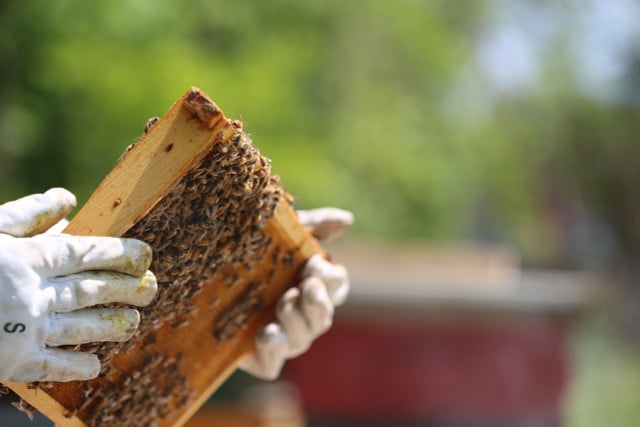


(Foto: CC0 / Pixabay / Thisabled)
There are about 2.8 million honeybee colonies in the United States, which is nearly a billion honeybees just in U.S. and Canada territories. Even though some media campaigns encourage the “save the bees” movement, this doesn’t necessarily apply to honeybees, which aren’t endangered. Even though honeybees are important for agriculture, they also compete with native bees which are often species at risk. This causes a destabilization of many natural ecosystems, since it is getting hard for native bees to survive. The practice of beekeeping around the world for commercial practices helps farmers with their agriculture and ensures the pollination of many crops. However, these practices benefit people more than they benefit the environment and the conservation of other pollinators.
Even though honeybees can be invasive to other species, there are several causes that are negatively affecting them and other species of bees:
- Lack of habitat: Honeybees need both nectar and pollen, which they gather and take back to their hive. Some of the nectar and pollen is used to feed adult bees, and part of it is stored in honeycomb cells. Once there, it will turn into honey and will serve the honeybees as their food source throughout the winter months. However, habitat loss is a big cause of concern for many pollinators. The expansion of cities and towns, and the construction of new infrastructures, leaves less natural habitat with flowers and plants that honeybees need to in order to survive.
- Harmful pesticides: Synthetic chemicals used for agriculture can kill bee populations. These pesticides can harm honeybees and other pollinators through their presence in nectar and pollen during the pollination process.
- Climate change: Honeybees are threatened by the shift in typical weather patterns that we are having because of climate change. Deforestation or extreme natural disasters are causing honeybees and other pollinators to lose their homes. If that happens, they can’t reproduce which means they won’t be able to pollinate.
- Unethical beekeeping practices: Honeybees are brought by farmers to pollinate entire crops during season. However, these managed honeybees sometimes compete with other bees that live in the same habitats. For this reason, poorly managed beekeeping can threaten wild native bee species as well as honeybees.
How to Help the Bees
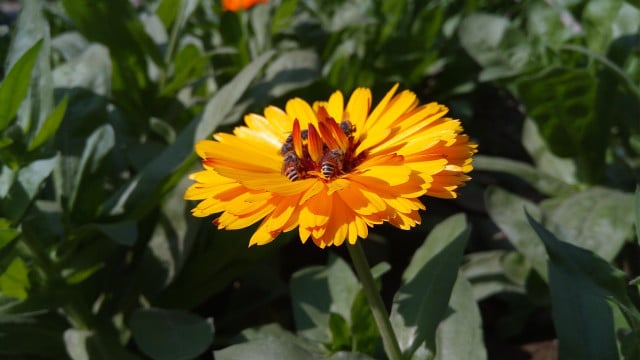


(Foto: CC0 / Pixabay / wasim___cool)
If bees disappear, animals and plants won’t be the only ones directly affected. We will have a major change in our food supply, since honeybees and other pollinators are responsible for about 80% of all pollination around the world. Wondering how to make a positive impact? Here is what you can do to help the bees:
- Buy local and/or organic produce: Support farmers who practice bee-friendly agriculture themselves. When you buy organic, you know that no synthetic pesticides were used to grow that produce, and it’s much more unlikely that bees were harmed in the process.
- Grow bee friendly plants in your garden: You can grow flowers for bees, garden plants, flowering bushes, bee balm flowers, herbs, vegetable plants, etc. Due to major losses of wildflower landscape, mostly in cities and urban areas, honeybees often don’t have a safe habitat where they can find food sources and create a home. If you have a garden, you can take advantage of it and provide a safe place for the bees! If you live in an apartment and you have a balcony or rooftop, you can try urban gardening to help pollinators.
- Don’t use chemicals: We still don’t really know to which extect synthetic fertilizers are harmful to bees. By using organic products, ideally OMRI-certified, or making your own homemade fertilizer, you should be on the safe side. Keep pesticides out of your garden, though, as they can be instantly lethal to bees.
- Make a bee “pond”: Bees can’t swim, but they also need water! You can make a DIY bee waterer with a small container filled with water, and a couple of stones that the bees can land on without getting their wings wet.
Helping bees often raises the question on whether consuming honey does more harm to the bees than it helps them. If you buy honey, buy raw, local and ethical. When you buy local honey, you are supporting your local beekeepers and their bees, as well as the environment in your town or city. In addition, raw local honey is often healthier than most commercial honey that has been refined and processed, which directly benefits you as well. However, often there isn’t a way to know how the local beekeeper is really treating the honeybees: They might be overharvesting their honey, feeding them inferior sugar syrup and therefore harming these pollinators. It might be worth investing a bit of time in researching which local beekeepers others recommend, which are known to treat their bees fairly, or even try and visit one yourself. When unsure, the best option is to opt for a vegan honey alternative, such as maple syrup or agave syrup.
Read on:
- Don’t Worry, Bee Happy: 10 Tricks to Keep Wasps Away
- 10 Small Ways to Help Bees That Will Make a Difference
- Human Environment Interaction: Definition & Examples
Do you like this post?






